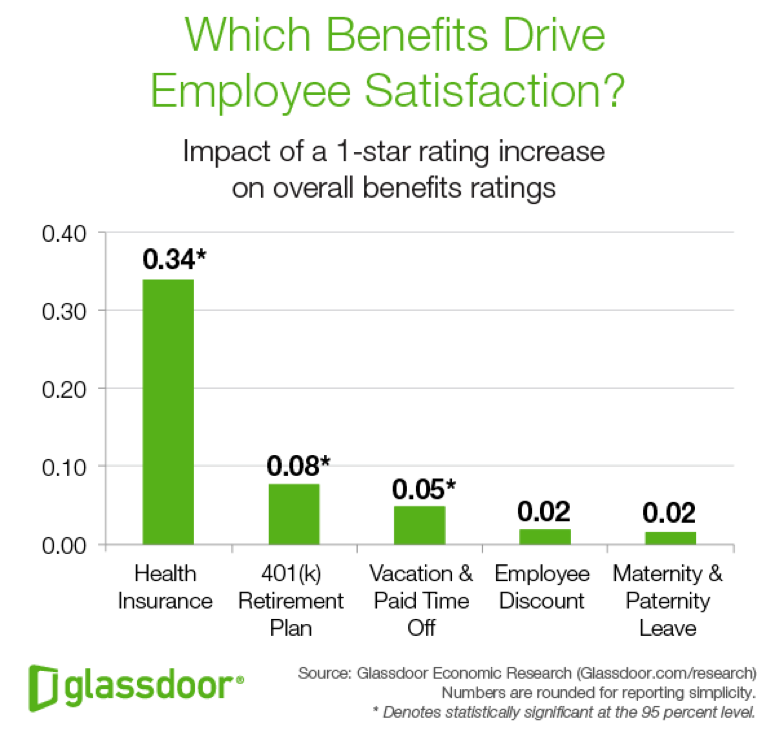Much of the talk today in recruiting is around the candidate-driven market and what professionals and companies alike need to do to go above and beyond the job posting to find the right people.
This jobseeker-centric landscape is making hiring more difficult across the board, but for small businesses, competing for talent with larger established players adds an extra layer of challenge— with 48% of small businesses reporting a shortage of qualified applicants for their open positions.
So what can your small business do to attract top talent?
Benefits Relate Directly to Employee Satisfaction
Small businesses that may not be able to offer the attractive base salaries or that may not have the brand currency that larger companies claim may want to start by thinking about benefits. Interestingly enough, recent Glassdoor studies found that four in five workers prefer new benefits over a pay raise and that benefits are in the top five pieces of information jobseekers want to be able to find when researching a place to work.
However, as a small business in a competitive marketplace, it’s important to ask:
- Which benefits pack the most punch when it comes to employee satisfaction?
- Which benefits can I afford to provide?
The same Glassdoor study found that these three benefits increase employee satisfaction the most:
- Health insurance
- 401(k) plans
- Vacation and paid time off

Luckily for most small employers, many of these benefits are already in place in some form or another.
So while you may not need to add any of these benefits, it might be worth sprucing yours up. Whether you consider covering 401(k) fees for employees or offering a health plan with greater coverage than your nearest competitors, it’s important to take a look at your current offerings with a critical eye.
You may also be wondering about all those other benefits? It turns out that many of the flashier benefits (e.g. pet-friendly offices, fully catered meals, on-site gyms) actually rank fairly low against employee satisfaction. So while inviting Fido and every other dog into the office might be a good idea for other reasons, don’t count on it swinging an applicant one way or another.
Where your small business can shine
Where your small business may compare favorably against larger companies – and where you don’t necessarily need to shell out a ton of cash – is in the realm of flexible scheduling. Telecommuting is no longer a fringe benefit in people’s minds; it’s a primary consideration when accepting a job. According to the Heartland Monitor Poll, 67% of employees would prefer more flexibility in their schedules, even if that means less pay. With many small businesses currently without formal work-from-home policies, now might be a good time to consider adding in a telecommuting option for employees.
Small businesses might also consider:
- Offering professional development perks, such as mentoring programs or paid trainings. With career growth opportunities being a top consideration for job seekers before accepting an offer, this can be crucial in attracting talent. According to Deloitte, professional development and mentorship is particularly important to millennials, especially in combatting the general lack of loyalty they feel to their employers.
- Providing discounts on the products and services you offer.
- Giving back to the community. Employees and jobseekers alike want to see how the business is invested in the community and how they will have the opportunity to participate in volunteer activities.
- Looking at benefits packages as customizable. Baby boomers and millennials place different values on different perks and benefits. Examine your workforce and try to hit the sweet spot.
Promote your perks and benefits
Once your small business has refined your perks and benefits, it is important to leverage them as a recruiting tool. Don’t wait for the interview or the offer letter to share what makes your company special!
Company perks and benefits are an important part of your employer brand and should be featured on your company website and social media channels, and included in your job descriptions.
For more info on how to leverage the perks and benefits that make up an employer brand, read our post on 8 Great Ways to Promote Your Employer Brand.
 MightyRecruiter
MightyRecruiter




Leave a Reply